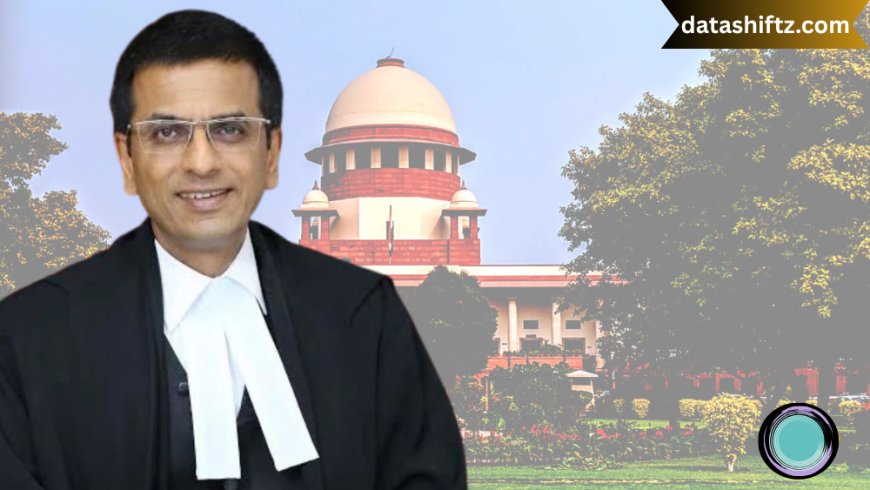Chief Justice Chandrachud: Architect of Progressive Jurisprudence in India

Introduction
The judiciary in India serves as the cornerstone of the democratic framework, ensuring that the Constitution remains a living document that evolves with time. At the helm of this crucial institution stands Dr. Dhananjaya Yeshwant Chandrachud, the 50th Chief Justice of India (CJI). Sworn into office on 9th November 2022, Justice Chandrachud has come to symbolize a modern, progressive, and inclusive interpretation of the Indian Constitution.
Known for his scholarly depth, digital reform initiatives, and liberal approach to individual rights, Chief Justice Chandrachud represents a transformative era in the Indian judiciary. This article provides a comprehensive overview of his background, judicial philosophy, landmark judgments, digital court reforms, and his impact on India's legal landscape.
Early Life and Education
Justice D.Y. Chandrachud was born on 11th November 1959. He hails from a legacy of judicial excellence — his father, Justice Y.V. Chandrachud, served as the longest-serving Chief Justice of India from 1978 to 1985.
Education Highlights:
| Level | Institution | Degree/Focus |
|---|---|---|
| Schooling | Cathedral and John Connon School, Mumbai | — |
| Undergraduate | St. Stephen’s College, Delhi | BA in Economics |
| Law Degree | Campus Law Centre, University of Delhi | LLB |
| Postgraduate | Harvard Law School | LLM and Doctorate in Jurisprudence |
Judicial Career Path
Justice Chandrachud’s career has spanned decades of dedicated service to law, both on the bar and the bench.
Timeline of Judicial Positions:
| Year | Position | Court |
|---|---|---|
| 1998 | Additional Solicitor General of India | Government of India |
| 2000 | Judge | Bombay High Court |
| 2013 | Chief Justice | Allahabad High Court |
| 2016 | Judge | Supreme Court of India |
| 2022 | Chief Justice | Supreme Court of India |
Landmark Judgments by Chief Justice Chandrachud
Justice Chandrachud has delivered and contributed to numerous landmark judgments that have shaped modern India.
List of Notable Judgments:
-
Right to Privacy (2017)
– Held privacy as a fundamental right under Article 21. -
Section 377 Decriminalization (Navtej Singh Johar, 2018)
– Decriminalized consensual homosexual relationships. -
Sabarimala Verdict (2018)
– Supported the entry of women of all ages into Sabarimala temple. -
Aadhaar Verdict (2018)
– Delivered a dissenting opinion criticizing mass surveillance through Aadhaar. -
Bhima Koregaon Case
– Advocated for civil liberties in the face of state surveillance and detention. -
Demolition of Babri Masjid (2019)
– Part of the constitutional bench that awarded the disputed land to the Hindu parties, while terming the demolition as a violation of law.
Judicial Philosophy and Vision
Justice Chandrachud is widely regarded as a liberal constitutionalist, deeply committed to upholding human dignity and individual rights. His judgments often reflect sensitivity toward marginalized communities, gender justice, and technological integration in legal systems.
Core Elements of His Philosophy:
| Principle | Description |
|---|---|
| Constitutional Morality | Emphasis on upholding the Constitution above tradition |
| Human Dignity | Recognition of privacy, identity, and freedom as essential rights |
| Judicial Independence | Strong voice against political influence in legal matters |
| Inclusivity | Focus on gender, caste, and minority rights |
Digitization of Judiciary
Under his leadership, the Indian judiciary has undergone significant digital transformation, especially post-COVID-19.
Key Initiatives Introduced:
-
Live Streaming of Court Proceedings: Bringing transparency to high-profile cases.
-
E-Courts Mission Mode Project: Enabling digital case management and filings.
-
Virtual Hearings: Facilitated hybrid courtrooms and e-bench access across the country.
-
AI Integration in Case Listing: Promoting efficient and unbiased hearing schedules.
Challenges and Criticism
Despite his accolades, Justice Chandrachud has also faced criticism on certain fronts.
List of Challenges:
-
Backlog of Cases: Despite digitalization, pendency remains high in lower courts.
-
Polarization over Progressive Verdicts: Some verdicts have met with political or religious backlash.
-
Pressure on Judicial Independence: Calls for reforms in judicial appointments and Collegium transparency.
-
Implementation Gaps: Many progressive judgments face execution delays at ground level.
Nonetheless, he is praised for balancing judicial activism with institutional integrity.
Recognition and Public Image
Justice Chandrachud is not just respected for his jurisprudence but also admired for his empathetic approach and engagement with young legal minds. He regularly speaks at law universities, publishes legal opinions, and encourages open dialogue on sensitive issues.
Awards and Recognition:
| Award | Description |
|---|---|
| Justice V.R. Krishna Iyer Award | For contributions to social justice |
| Harvard Law Distinguished Alumnus | Recognized for global legal influence |
| Human Rights Defender (NGOs) | Celebrated for rulings favoring LGBTQ+ and women's rights |
Impact on Legal and Social Landscape
Justice Chandrachud’s judgments and reforms have left a lasting mark on Indian society.
List of Broad Impacts:
-
Strengthened LGBTQ+ Rights
-
Upheld Gender Equality in Worship
-
Advanced Data Privacy Norms
-
Promoted Judicial Accessibility via Technology
-
Defended Academic and Press Freedoms
His tenure is often described as a judicial awakening in India’s legal framework.
Future Outlook
Justice Chandrachud is set to serve as CJI till 10th November 2024, making it one of the longest recent tenures for a Chief Justice. During this time, he is expected to:
Upcoming Focus Areas:
-
Judicial Appointments Reforms
-
Lower Court Digitization
-
Climate and Environmental Justice
-
Safeguarding Civil Liberties
-
Expanding Legal Aid for Underprivileged
With a strong commitment to transparency and constitutional supremacy, Justice Chandrachud is likely to leave a powerful legacy.
Conclusion
Chief Justice D.Y. Chandrachud is a jurist of exceptional intellect, compassion, and conviction. His work is not confined to courtrooms alone—it echoes in classrooms, social movements, and policy debates. At a time when democracies across the globe are grappling with polarization and misinformation, Justice Chandrachud’s progressive approach offers a vision of hope, justice, and equality.
His leadership of the Indian judiciary marks not just a legal chapter, but a profound civilizational shift toward a more inclusive and rights-based society. As he continues to write the future of Indian law, he reinforces the belief that justice is not a privilege—it is a right guaranteed to all.





























